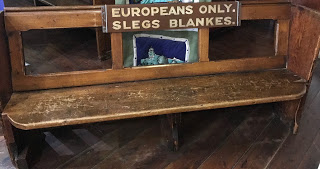 |
| Apartheid-era seating from South Africa |
or: Be The Change You Want To See
Travelling has me again thinking about inclusion and what we can do as individuals.
Governments can legislate for anti (or pro) discrimination, equal opportunity and so on but until each of us takes individual action to include others who are not necessarily “the same” as us, a true multicultural society can never happen. There will always be an “us” and a “them”. It doesn’t have to be this way.
Mauritius has been a great example of working multiculturalism. They have had a few hundred years to reach this point and different island “owners”. In contrast, many countries now have an unprecedented number of immigrants to their shores and are struggling for a variety of reasons e.g. insufficient infrastructure, not enough jobs (perceived or otherwise), welfare programs etc. These same countries also seem to be full of individuals who have forgotten they are not indigenous to that country and are either immigrants themselves or their descendants were. Many of us were new once and remembering this can help us to be more inclusive of others who are new now whether it is to the neighbourhood, country or even company.
Current unemployment rates
| Country | Percentage |
| Mauritius |
7.9
|
| UK |
4.7
|
| Australia |
5.9
|
| US |
4.5
|
| France |
10
|
| Germany |
3.9
|
So what can we each do?
Start small and keep it simple.
Of course if you have the time, and / or resources, inclination and courage (it may be necessary), go large!
In the meantime, we can each help to rebuild a sense of community. This seems to have been a thing of the past which doesn’t seem to be so common in many western countries anymore. It brought so many benefits and for some reason, we lost it. We’ve been focused on differences and keeping to ourselves. Individualism seems to have become more important.
Let’s make community fashionable again. It sounds daunting. Broken down into little steps, it really isn’t. The hard part can be starting but it doesn’t have to be.
Possible starting points
- We can remember back to when we were new somewhere, what that felt like and who helped us settle and what they specifically did. Could they have done something else to help? Keep this feeling alive in your memory, it helps with future interactions with people in a similar situation and may even give you some ideas about what you can do to help them.
- We can introduce ourselves to our neighbours and have a conversation. How to start especially when we’ve been neighbours for ages and have never done this before? How about with knock on their door, a smile and a “Hello, I’m (insert your name here) and I live at (insert your address here). We’ve been neighbours for (insert length of time here). I know this might seem a little weird, given that length of time but I want to make an effort to get to know the people that live nearby. How are you today?” and taking it from there. You will always find common ground since you are in the same neighbourhood in the first place. They may have chosen it for the same reason you did.
- Chat with those that assist you when you are shopping, comment on something of likely significance to them, a piece of jewellery, their shoes, it doesn’t matter, just start talking and listening to their response. Making someone else feel good in your neighbourhood goes a long way as they will then make the next person feel good. It is a great way of spreading happiness.
- No gossip – this is one of the fastest ways to lose trust. If you tell people things about others, why would they open up to you knowing that what they say may then be shared? Gossip builds shallow relationships, not community. Build trust by sharing information about yourself and listening to information they share about themselves. Ask open questions (ones that don’t lead to yes or no answers) and listen.
- Don’t wait to visit them, visit them early on in their relocation and offer them the help you did / didn’t receive when you moved
- Check in with them over the next few weeks and months more regularly than you may do otherwise to see how they are settling and if there is anything else you can do to help. Perhaps they don’t know how to set up a bank account in your country or perhaps they don’t know where to buy the best apples. Whatever, give them the benefit of what you have learnt in your time living there. Share information.
- In my youth, people brought food to their new neighbours. It’s a bit more difficult nowadays with various food allergies etc but a welcome card with the names and numbers of nearby shopping centres, doctors, and other emergency numbers, a map of nearby places of interest etc would be useful. If you do want to give a gift, it may be better to do this at your second meeting when you know a bit more about your new neighbour and have time to research what may or may not be culturally appropriate for them or what they may actually want or need.
- you will always learn something new
- building a sense of community means you will also have additional support near at hand in the event you need it in the future
- a reminder that we have more in common than we have different helps to build trust
- you may even make a new lifetime friend
- you could find quite a few of you have a particular hobby or area of interest in common and can enjoy this activity together which will further build community and trust
- your new neighbour will do this with others in the future as they will see this as normal for your neighbourhood; you have paid it forward
There are countless other things we can each do to be more inclusive of others. This is definitely not an exhaustive list! These are merely a suggested starting point, not too far outside your front door so you lose the excuse of it not being convenient. Sacrificing some television or reading time to do this at least once a week should not be too difficult for you to then know your nearby neighbours in a relatively short space of time.
Baby steps.
As Michael Jackson sung
“If you want to make this world a better place, take a look at yourself and make that change.”
Now, take a few deep breaths and go and knock on that door.
* Thanks to Michael Jackson for the title to this post. Click here to watch the video. It’s a great reminder of why taking even baby steps is important as well as to appreciate the song itself and why it made No. 1 in four countries in 1988 (US, Italy, Poland and Belgium). He was the first artist to have four of five consecutive singles as No. 1 in the US. Pretty impressive.

